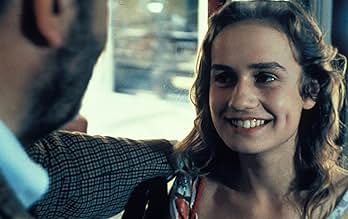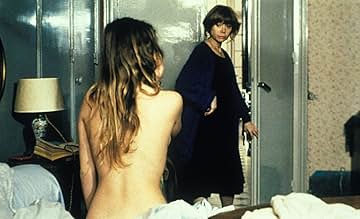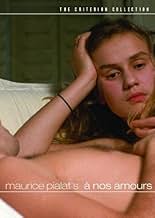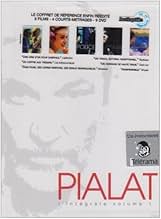À nos amours
- 1983
- Tous publics
- 1h 39m
IMDb RATING
7.1/10
7.6K
YOUR RATING
An erratic young woman's family desperately tries to prevent her increasingly erotic ways.An erratic young woman's family desperately tries to prevent her increasingly erotic ways.An erratic young woman's family desperately tries to prevent her increasingly erotic ways.
- Director
- Writers
- Stars
- Awards
- 4 wins & 3 nominations total
- Director
- Writers
- All cast & crew
- Production, box office & more at IMDbPro
Featured reviews
10bob998
Let me get it off my chest now: I'm very disappointed in the lack of notice given Pialat's films. Why am I only the fifth person to review À nos amours, and not the 500th? This is the sixth feature by Pialat, and it is a masterpiece. The travails of Suzanne and her family have universal implications; if you think only of her relations with her brother Robert--violent at times, yet often tender and half-incestuous--that's enough material for a film in itself. Some people are bothered by the promiscuous nature of Suzanne's love life, how she just doesn't behave like a regular teenage girl should. I have met a girl like her.
About two-thirds of the way through, we are confronted with a scene of astonishing virtuosity: the party at the family home, into which erupts the absent father, played by Pialat himself. The script the actors had been given gave no notice of this plot turn; it is fascinating to watch eight actors dealing with this incredible event--no one blows the scene, no matter how dumbfounded they must have been. For about ten minutes, we get pure acting, or reacting, however you want to put it. This is the kind of film event that makes movies worthwhile.
Bonnaire is tremendous, it's one of the greatest debuts in film history. Pialat as the father is great, all the more remarkable in that he had never acted before. The dimple scene is wonderful. Dominique Besnehard has to bring off an unsympathetic role as the brother, and he performs very well.
About two-thirds of the way through, we are confronted with a scene of astonishing virtuosity: the party at the family home, into which erupts the absent father, played by Pialat himself. The script the actors had been given gave no notice of this plot turn; it is fascinating to watch eight actors dealing with this incredible event--no one blows the scene, no matter how dumbfounded they must have been. For about ten minutes, we get pure acting, or reacting, however you want to put it. This is the kind of film event that makes movies worthwhile.
Bonnaire is tremendous, it's one of the greatest debuts in film history. Pialat as the father is great, all the more remarkable in that he had never acted before. The dimple scene is wonderful. Dominique Besnehard has to bring off an unsympathetic role as the brother, and he performs very well.
Being so restrained, blunt and straightforward, Pialat's film is also enormously touching. The concreteness of the world he creates here is tangible. Psychological realism true in each detail, and as ensemble. The brutal restraint is somehow disconcertingbeing given the bad habits inflicted by the standard psychology of most other films. Pialat's project was a naturalist one, hence the impression of a thing just begun, just started, still in progress. (It would be, anyway, absurd and stupid to try reducing Pialat's implicit aesthetics to some theoretical statements and criticism's clichés.) What is obvious is that Pialat achieved his aimfinding the fourth dimension of this coming of age story. For me,Pialat might not be worthy of love; he is certainly worthy of respect. In his moviesnot only in this one, but in several others as wellone finds not only probitybut also genuine power, inspiration, the strength of a secret master, Pialat. Good and serious director, keen psychologist, avid of femme's perfume and scent, intelligent and uncompromising.
In psychology, Pialat rightly perceived the distances and the gaps and ,as it were, the laws of the perspective. In this movie, Pialat uses this sensational and hidden knowledge to tell the tribulations of a gamine.
The amazing lead actress is worth seeing; with her, the film took one more chance at the ineffable.
Any movie is made with elements,but it lives out of the rapports and the ideas.On the cinematographic elements' level,Pialat's movie is austere.There is no bit of stylization,but each element has a 4th. dimension:the rapports' level.This dimension is widened by the music.Purcell's suitable music gives the action a strange coherence.The movie is made out of relations,rapports,reflections.Far from being some kind of a flat realism,Pialat's movie lives entirely out of this wealth of thought.
Most important,this strengthener,firm,intelligent,bitter,even poignant realism is not fake.
A courageous decision is the refusal of all stylization.(The "cruel movie",the ferocious movie relies on stylization.)True realism means ideas,reflection,a lively mind.Far from being mechanical and passive,it is fertile and elastic.
This movie is also a medicament.
I find it disappointing that only 3 comments were written here for "À nos amours ".Also,the weighted average vote of 7.5 / 10 is unfair.
Miss Bonnaire is a standout.Her cinema presence in "A Nos ..." surrounds the viewer.
In psychology, Pialat rightly perceived the distances and the gaps and ,as it were, the laws of the perspective. In this movie, Pialat uses this sensational and hidden knowledge to tell the tribulations of a gamine.
The amazing lead actress is worth seeing; with her, the film took one more chance at the ineffable.
Any movie is made with elements,but it lives out of the rapports and the ideas.On the cinematographic elements' level,Pialat's movie is austere.There is no bit of stylization,but each element has a 4th. dimension:the rapports' level.This dimension is widened by the music.Purcell's suitable music gives the action a strange coherence.The movie is made out of relations,rapports,reflections.Far from being some kind of a flat realism,Pialat's movie lives entirely out of this wealth of thought.
Most important,this strengthener,firm,intelligent,bitter,even poignant realism is not fake.
A courageous decision is the refusal of all stylization.(The "cruel movie",the ferocious movie relies on stylization.)True realism means ideas,reflection,a lively mind.Far from being mechanical and passive,it is fertile and elastic.
This movie is also a medicament.
I find it disappointing that only 3 comments were written here for "À nos amours ".Also,the weighted average vote of 7.5 / 10 is unfair.
Miss Bonnaire is a standout.Her cinema presence in "A Nos ..." surrounds the viewer.
A perfect example which illustrates why being truth to life sometimes doesn't often equal great movies. Maurice Pialat wasn't completely truthful in its depiction of youth's shallowness but he isn't completely off mark, just a few objectionable things that look bizarre, too exploitative or unbelievable. But that's life sometimes. "À Nos Amours" ("To Our Loves") focus is a teenage girl (Sandrine Bonnaire) and the way she conducts her sexual relationships, first with a boyfriend, the good hearted Luc (Cyr Boitard), and later evolves to sometimes mindless, sometimes affectionate casual encounters with other guys. Almost fine if it wasn't for her family bothering with this, and a somewhat unpredictable disintegration when her father (Pialat) decides to leave the family. What spirals after that is an emotional roller-coaster with the infatuated girl being a victim of constant reprehension and beatings from her older brother, now head of the family, and the mother who seems to be rotting away into madness, not knowing how to cope with everything happening around her. And there's plenty of time for her dedicate some time with her lovers, miserable for not getting the love she deserves.
One goes through this with plenty of expectations and interest but one walks out with plenty of reservations and little gain. C'mon, this was made in 1980's and you're telling me that even back then, in such a bourgeoisie family, allegedly cultured, they treat the typical adolescent behavior in that horrid way? With punches, yells and stuff? I would expect this in a poorer background. Everything's so over-the-top, so forced, very off-putting. The movie seems to suggest that there's something going on between father and daughter and also between brother and sister, just suggest some incestuous relations but never goes into that deep.
What Pialat captured with some excellency was youth's boredom, trying everything to escape from the usual routine of schools, classmates, and dealing with parents; youth's incapacity to love or find love, or using such as something to pass the time, not knowing what love truly means, going from one relationship to another, desperate to find something new that may cure them from their boredom and apathy towards life. This is clearly evidenced in the scene where the girl has an one night stand with an English sailor. She had her fun, experienced something great but she doesn't show much after the fact, a little worried because she cheated on her boyfriend. It isn't a first rate portrayal, obviously, but it's far more realistic than the other topics already mentioned (the family matters). The movie strangely went absurd towards the ending, giving unexplainable solutions and the strange return of the father.
I enjoyed this movie, enjoyed its good pace, it makes you interested with the very few it has to share. A little saddening that it wasn't all that much of a good film as a Cesar Award winner should be. Bonnaire, in one of her earliest roles, has plenty of qualities despite the relative lack of expression her character has, constantly down, sad, beaten. Far from being the great French cinema but beautiful to look at. 6/10
One goes through this with plenty of expectations and interest but one walks out with plenty of reservations and little gain. C'mon, this was made in 1980's and you're telling me that even back then, in such a bourgeoisie family, allegedly cultured, they treat the typical adolescent behavior in that horrid way? With punches, yells and stuff? I would expect this in a poorer background. Everything's so over-the-top, so forced, very off-putting. The movie seems to suggest that there's something going on between father and daughter and also between brother and sister, just suggest some incestuous relations but never goes into that deep.
What Pialat captured with some excellency was youth's boredom, trying everything to escape from the usual routine of schools, classmates, and dealing with parents; youth's incapacity to love or find love, or using such as something to pass the time, not knowing what love truly means, going from one relationship to another, desperate to find something new that may cure them from their boredom and apathy towards life. This is clearly evidenced in the scene where the girl has an one night stand with an English sailor. She had her fun, experienced something great but she doesn't show much after the fact, a little worried because she cheated on her boyfriend. It isn't a first rate portrayal, obviously, but it's far more realistic than the other topics already mentioned (the family matters). The movie strangely went absurd towards the ending, giving unexplainable solutions and the strange return of the father.
I enjoyed this movie, enjoyed its good pace, it makes you interested with the very few it has to share. A little saddening that it wasn't all that much of a good film as a Cesar Award winner should be. Bonnaire, in one of her earliest roles, has plenty of qualities despite the relative lack of expression her character has, constantly down, sad, beaten. Far from being the great French cinema but beautiful to look at. 6/10
15-year old Suzanne (Sandrine Bonnaire) is a precocious child, living with her mother, her career-driven brother, and her sometimes overbearing father (played by Maurice Pialat). She has recently split from her boyfriend and is intent on moving from man to man in search of sexual pleasures and guardianship. When her father splits from her mother and moves out, home life becomes unbearable as her mother and brother disapprove of her lifestyle. She is most comfortable in the arms of a man, be it one of her seducers or her father. Men seems to flock to her, as she is pretty, charming and is happy to accommodate her admirers.
This is the second film that I've seen directed by French master Maurice Pialat, the other being the excellent L'Enfance Nue. They are both similar films in terms of themes and execution, and tell the familiar coming-of-age story from an original perspective. Whereas the former was a sledgehammer portrayal of a young juvenile causing havoc amongst the various foster homes he was placed, where redemption never seems possible, A Nos Amours' Suzanne is a more sympathetic lead character, and her journey is portrayed in a more subtle manner. While it would be shocking to hear of a 15 year old girl bedding a number of men, Pialat is more focused on what drives her to act this way.
She is not a tease, and she doesn't flaunt her body to anyone who will look. Instead, she seems to simply enjoy the comfort of a man. When the father moves away, her home life falls apart and her bed-mates increase. Perhaps Pialat is trying to portray the impact an absent father can have on a child, or that all women need comforting every once in a while. Or maybe this is an individual character study, with no overriding message. What it most definitely is, though, is a wonderfully acted (especially from the young Bonnaire), intelligent, and intriguing film that has Pialat's usual cold detachment alongside a certain intimacy with the lead character.
www.the-wrath-of-blog.blogspot.com
This is the second film that I've seen directed by French master Maurice Pialat, the other being the excellent L'Enfance Nue. They are both similar films in terms of themes and execution, and tell the familiar coming-of-age story from an original perspective. Whereas the former was a sledgehammer portrayal of a young juvenile causing havoc amongst the various foster homes he was placed, where redemption never seems possible, A Nos Amours' Suzanne is a more sympathetic lead character, and her journey is portrayed in a more subtle manner. While it would be shocking to hear of a 15 year old girl bedding a number of men, Pialat is more focused on what drives her to act this way.
She is not a tease, and she doesn't flaunt her body to anyone who will look. Instead, she seems to simply enjoy the comfort of a man. When the father moves away, her home life falls apart and her bed-mates increase. Perhaps Pialat is trying to portray the impact an absent father can have on a child, or that all women need comforting every once in a while. Or maybe this is an individual character study, with no overriding message. What it most definitely is, though, is a wonderfully acted (especially from the young Bonnaire), intelligent, and intriguing film that has Pialat's usual cold detachment alongside a certain intimacy with the lead character.
www.the-wrath-of-blog.blogspot.com
For many, the lack of a defined storyline is maddening, often resulting in a less than satisfying experience. Almost stream-of-consciousness in its approach, Maurice Pialat's À Nos Amours does not appear to have much story structure, but the story is most definitely there and is related with a subtlety not often found in modern film.
Bonnaire's portrayal of Susanne is brilliant (as others have said), and her almost wistful sadness permeates the performance. In one scene, her father (played by Pialat) says, "You never smile anymore," indicating the transformation of Susanne from innocence to experience. The men in her life are shown only for the time she is with them. There is neither introduction upon their arrival nor explanation as to their departure. Pialat uses this method to show Susanne's lack of emotional investment in these temporary romances.
The only men who do return are her father, her brother, and Luc, her one real love. It is when she is with these men that she shows her true self, rather than the detached uncaring girl who sleeps around in an effort to replace them. The dialogue drives this film. There is little music, save the inspired use of Klaus Nomi's "The Cold Song". The sad wailing of Nomi's pseudo-operatic vocal against the opening credits of Susanne in the pulpit of a boat is a wonderful moment.
Long out of print, this film is now available on DVD. It is deserving of a look by the discerning cinephile who may have missed it 25 years ago.
Bonnaire's portrayal of Susanne is brilliant (as others have said), and her almost wistful sadness permeates the performance. In one scene, her father (played by Pialat) says, "You never smile anymore," indicating the transformation of Susanne from innocence to experience. The men in her life are shown only for the time she is with them. There is neither introduction upon their arrival nor explanation as to their departure. Pialat uses this method to show Susanne's lack of emotional investment in these temporary romances.
The only men who do return are her father, her brother, and Luc, her one real love. It is when she is with these men that she shows her true self, rather than the detached uncaring girl who sleeps around in an effort to replace them. The dialogue drives this film. There is little music, save the inspired use of Klaus Nomi's "The Cold Song". The sad wailing of Nomi's pseudo-operatic vocal against the opening credits of Susanne in the pulpit of a boat is a wonderful moment.
Long out of print, this film is now available on DVD. It is deserving of a look by the discerning cinephile who may have missed it 25 years ago.
Did you know
- TriviaIn the original script, the father was due to die and was not scheduled to return at the time of the dinner scene. Maurice Pialat walked into the scene and left the actors to improvise in a situation they hadn't planned for.
- GoofsIn the sequence with the American, Suzanne's outfit changes from a one-shoulder black dress with white stripes trimming just the top of the bodice, to a one-shoulder black&white striped top with a black skirt, and back again.
- ConnectionsFeatured in Sebastian (2024)
- How long is To Our Loves?Powered by Alexa
Details
- Release date
- Country of origin
- Official sites
- Languages
- Also known as
- Les Filles du Faubourg
- Filming locations
- Cité Bergère, Paris 9, Paris, France(Suzanne and Jean-Pierre looking for a hotel)
- Production companies
- See more company credits at IMDbPro
Box office
- Gross worldwide
- $2,575
Contribute to this page
Suggest an edit or add missing content






























